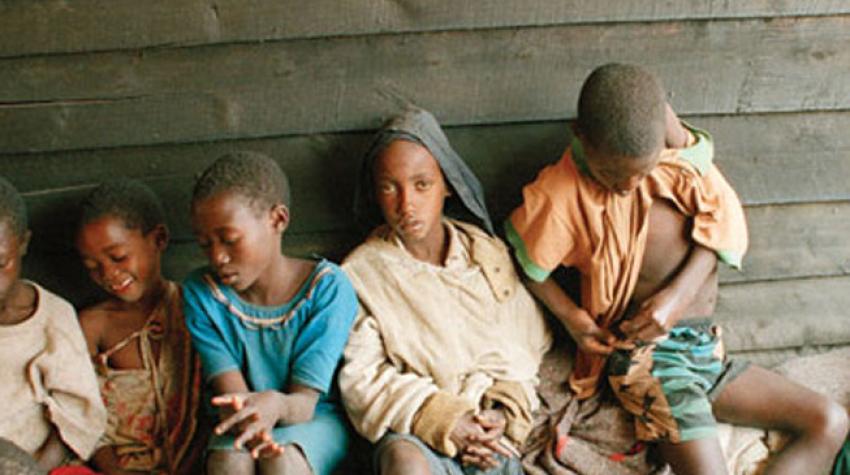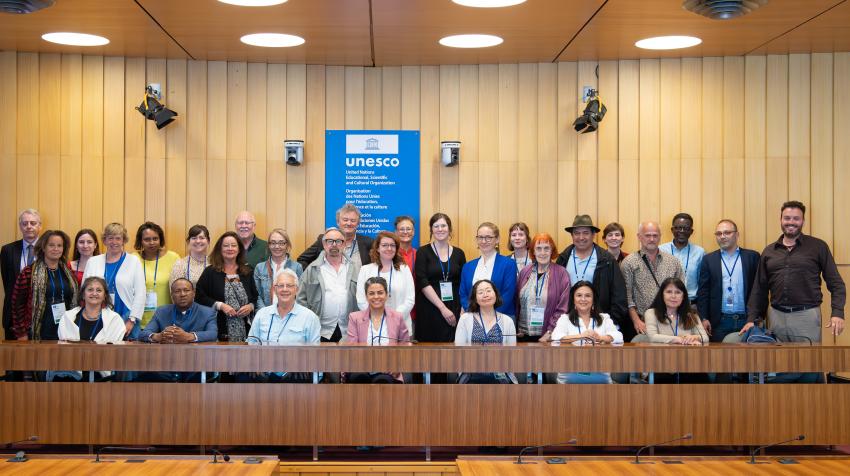December 2016, No. 4 Vol. LIII, Human Rights
When the atrocities committed by Nazi Germany became apparent after the Second World War, the consensus within the world community was that the United Nations Charter did not go far enough in defining the rights to which it referred, and that those rights should be defined and enshrined in a new body of international law. The United Nations was determined to ensure that the terrible crimes of the Second World War would never be repeated. It was in fulfilment of this commitment that, one day before the adoption of the Universal Declaration of Human Rights on 9 December 1948, the General Assembly adopted the Convention on the Prevention and Punishment of the Crime of Genocide. The adoption of the Convention was full of symbolism and reaffirmed the gravity of the crime it addressed. But it went beyond that. It demonstrated the commitment of the international community to ensure both the prevention of genocide and the punishment of its perpetrators when the crime could not be prevented. The Convention defined genocide as any particular offense committed with “intent to destroy, in whole or part, a national, ethnical, racial or religious group.”
It was not until the early 1990s, more than four decades after its adoption, that the Genocide Convention was applied for the first time, during the judicial processes that followed the Rwanda and Balkan conflicts. Its application in those contexts was significant primarily because it reaffirmed the inherent duty of States to hold individuals responsible for the crime of genocide, as well as other crimes committed during armed conflict. The International Criminal Tribunal for Rwanda and the International Criminal Tribunal for the former Yugoslavia were created by the United Nations Security Council, which used its power under Chapter VII of the Charter of the United Nations to establish these judicial bodies.
More than twenty years after the genocide in Rwanda, no memory evokes as much horror and revulsion as that of the systematic and widespread killing of around 1 million men, women and children, who were targeted because of their ethnicity and political affiliations during those fateful hundred days in the spring of 1994. The Rwanda genocide was tragic evidence of how easily the flames of violence could be fanned, and of the critical importance of timely and decisive action by the international community to save human lives.
In the aftermath of the international community’s failure to intervene to prevent the genocides in Rwanda and Srebrenica, former Secretary-General Kofi Annan posed the question, “When does the international community intervene for the sake of protecting populations?”
Investigations into those failures pointed to a number of information and communications weaknesses within the Organization, as well as the failure of political will on the part of the Member States. On 7 April 2004, Kofi Annan announced that he was launching an action plan to prevent genocide. At the launch, he stated, “If there is one legacy I would most wish to leave to my successors, it is an Organization both better equipped to prevent genocide and able to act decisively to stop it when prevention fails.”
The Action Plan called for the appointment of a Special Adviser on the Prevention of Genocide, who was tasked to:
• Collect existing information, in particular from within the United Nations system, on massive and serious violations of human rights and international humanitarian law of ethnic and racial origin that, if not prevented or halted, might lead to genocide
• Act as a mechanism of early warning to the Secretary-General, and through him to the Security Council, by bringing to their attention situations that could potentially result in genocide
• Make recommendations to the Security Council, through the Secretary-General, on actions to prevent or halt genocide
• Liaise with the United Nations system on activities for the prevention of genocide and work to enhance United Nations capacity to analyse and manage information regarding genocide or related crimes.
The task of the Special Adviser on the Prevention of Genocide is not to determine whether genocide has taken place. That is the responsibility of courts with the appropriate jurisdiction. The Special Adviser’s task is forward-looking: to raise the alarm and to advise the Secretary-General of an impending risk of genocide, and propose actions by the Secretary-General and the United Nations system to prevent the risk from escalating.
As Kofi Annan said, “If we are serious about preventing or stopping genocide in the future, we must not be held back by legalistic arguments about whether a particular atrocity meets the definition of genocide or not. By the time we are certain, it may often be too late to act. We must recognize the signs of approaching or possible genocide, so that we can act in time to avert it.”
Genocide is not an accident, nor is it inevitable. Genocide is a process that develops over time. To be able to engage in the level of violence associated with genocide, perpetrators need time to develop the capacity to do so, mobilize the resources and take concrete steps that will help them to achieve their objective. There are thus numerous warning signs along the road to genocide and as many opportunities to take action to prevent it. It is our inaction, or our ineffectiveness in addressing the warning signs, that allows genocide to become a reality.
We know from extensive studies of past cases of genocide what the warning signs are. The Office of the Special Adviser on the Prevention of Genocide has developed a framework of analysis to guide the assessment of early warning risks of genocide, as well as other war crimes and crimes against humanity (atrocity crimes) in any situation. The Framework of Analysis for Atrocity Crimes has been issued as an official document of the United Nations, and the Secretary-General has encouraged its use by international, regional and national actors as a tool for early warning and prevention.
The Framework contains two main analytical tools for assessing the risk of atrocity crimes: a list of 14 risk factors for atrocity crimes, and indicators for each. Among the 14 risk factors outlined, the first eight are common to all crimes. In addition to these common factors, the framework identifies six additional risk factors, two specific to each of the international crimes.
Common risk factors include situations of armed conflict or other forms of instability; a record of serious human rights violations, particularly if these form patterns of conduct and have not been adequately addressed; weakness of state structures that should serve to protect populations; and the potential motives or incentives that could be used to justify the use of violence against particular groups of populations. The specific risk factors result from the fact that each crime has elements and precursors that are not common to all three crimes. For example, one of the elements specific to the crime of genocide is t he intent to destroy, in whole or in part, a national, ethnic, racial or religious group. Evidence of such intent points to a higher risk of genocide.
One of the most significant risk factors associated with genocide is a record of identity-based discrimination, in other words, discrimination that targets individuals or groups based on their religious, ethnic, racial or national identity. Discrimination can take many forms. States may enforce the compulsory identification of members of a particular group or groups. These groups may face discrimination in access to resources or opportunities, or systematic exclusion from decision-making processes, employment in State institutions and/or key professions. The State may impose taxes or fines on a particular group or groups, require permission for social activities such as marriage or impose compulsory birth control. Overt justification of any kind of discriminatory practices always gives cause for concern, as does the promotion and tolerance of hate speech against a group or groups. Often, practices of discrimination are backed by violence. Arbitrary detention, forced disappearances, torture and killing, whether selectively targeting specific group members or indiscriminately targeting a group as a whole, are human rights violations that have been used to enforce and maintain practices of discrimination. Without group-level discrimination, even deeply held grievances are unlikely to translate into the patterns of fear, enmity and abuse that give rise to genocide.
Thus, to prevent genocide we need to attack discrimination and prejudice in all their forms, and the spread of hatred and hostility that is based on ethnicity, religion or any other form of identity. In the last few years, we have seen a dangerous outpouring of identity-based hatred, hostility and intolerance all over the world—in political campaigns, in response to the flight of refugees and migrants to Europe, in response to terrorist attacks by violent extremists and in many other situations. As we know from history, the manipulation of people’s concerns for political gain is irresponsible and dangerous. This is true in societies both at peace and at war.
In some of the gravest situations, in which armed conflict has torn societies apart, such as in the Central African Republic, Iraq and Syria, individuals and groups have been targeted based solely on their religious beliefs. Religion continues to be used to justify savage cruelty and atrocities. I say “used”, when in fact I mean “misused”. Religion is being manipulated by parties with vested interests, who stand to gain by fuelling hostility and hatred between people of different faiths, and who sometimes even incite and commit acts that may constitute atrocity crimes. This violence, and the failure to hold accountable those responsible, shatters societies.
We must do more to support religious leaders who do speak out, often at great risk to themselves. We must engage more with religious leaders so that their voices are heard, including less mainstream religious leaders—especially in situations where societies are divided along identity lines and tensions are high.
We must do more to build societies that are resilient to genocide and other atrocity crimes, and that can weather periods of stress. We know that where human rights are protected and the rule of law respected, where people do not face discrimination or exclusion on the basis of their identity—including their religious identity—they are more likely to coexist peacefully, and this peaceful coexistence lays the ground for social and economic development and prosperity. States that demonstrate that they value diversity and that promote the benefits of having a pluralistic society are more likely to be stable and strong. This principle of respect for diversity, respect for the differences between peoples, including their beliefs, is fundamental to t he development of stable and peaceful societies that can weather difficult periods.
We have made important advances since the Convention on the Prevention and Punishment of the Crime of Genocide was adopted on 9 December 1948, but the evil that the Convention aimed to end has proven difficult to eradicate. Changing that situation depends on us, on our will, our commitment, our actions and our persistence.
The UN Chronicle is not an official record. It is privileged to host senior United Nations officials as well as distinguished contributors from outside the United Nations system whose views are not necessarily those of the United Nations. Similarly, the boundaries and names shown, and the designations used, in maps or articles do not necessarily imply endorsement or acceptance by the United Nations.




